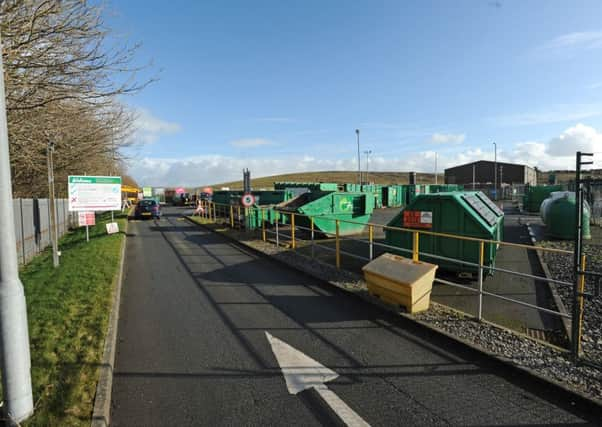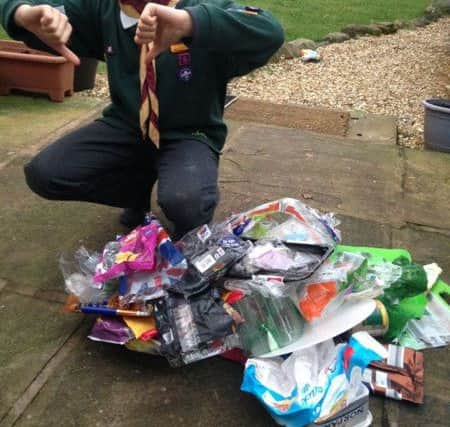Plastics campaign: What the supermarkets say


From fruit bags to meat packets, the amount of packaging wrapped around your weekly shop can be quite overwhelming, especially when you know a lot of it is going straight into landfill.
Around 6.3bn tonnes of plastic waste had been generated globally by 2015, with almost 80 per cent of it going to landfills or the natural environment. Supermarkets have come under increasing pressure to reveal how much plastic they create, with reports that they make more than one million tonnes per year here in the UK.


Advertisement
Hide AdAdvertisement
Hide AdIn the wake of Iceland announcing it aims to eliminate or drastically reduce plastic packaging of all its own-label products by the end of 2023, we hear from other supermarkets operating in the Lancaster and Morecambe area.
ASDA
Asda, which accounts for 15.3 per cent of the supermarket industry in the UK, has said it wants to create a more collaborative, open environment within the retail industry to help drive innovation and “unwrap” the plastics problem.
It has promised its customers that it will reduce the amount of plastic in its own brand packaging by 10 per cent this year, as well as work with suppliers and other experts to investigate new options to replace plastic packaging and find more recyclable solutions.


It said it will also introduce a zero profit re-usable coffee cup, and remove all single use cups and plastic cutlery from its offices in 2018 and all its stores and cafes by the end of 2019. It also said it will phase out 5p ‘single use’ carrier bags from its shops by the end of 2018 and introduce a donation to good causes from the sale of its “bags for life” so that charities don’t lose out.
Advertisement
Hide AdAdvertisement
Hide AdIt is also creating the Asda Plastic Ideas Hub, open to all from industry to individuals, offering a £10,000 award for every scaleable, workable idea that helps Asda to tackle its top plastic challenges – such as alternatives to plastic film.
ALDI
Aldi wants to source all its pulp-based packaging from certified forests by 2020 and has seen a relative reduction in packaging of 11 per cent between 2012 to 2015.
It has not sent any waste directly to landfill since 2014, and recycles 100 per cent of its cardboard and plastic.
An Aldi spokesman said: “We are committed to reducing waste across our business and supply chain as this helps us provide customers with the lowest grocery prices in the UK. As part of this process, we are reviewing all own-label plastic packaging to assess where further reductions can be made.”
MARKS & SPENCER
Advertisement
Hide AdAdvertisement
Hide AdMarks & Spencer says that more than 90 per cent of all its UK packaging is recyclable, and less than one per cent (by weight) of all its packaging can be traced back to polystyrene.
It has trialled new materials to replace its black CPET (a type of plastic) packaging, and the foils in packaging for biscuits and crisps.
Between 2007 and 2012 it reduced its total packaging by 25 per cent, and between 2012 and 2014, its food packaging usage per item decreased by 10 per cent.
It is also looking at using plastics made from plant-based oils.
SAINSBURYS
Advertisement
Hide AdAdvertisement
Hide AdSainsburys says it has reduced its own brand packaging by 35 per cent since 2005, with a target of 50 per cent by 2020. Nearly 40 per cent of its packaging already uses recycled content, while 83 per cent of its own packaging volume that’s sold is classed as widely recycled.
A spokesman said: “However, it’s important to remember that the purpose of packaging is to protect products through our supply chain, in our stores and in customers’ homes – i.e. products getting out/damaged and contaminants getting in.
“That said, when it comes to food packaging, we’re always looking at ways to package products that help reduce food waste, whether that’s introducing re-sealable packs, or making them lighter, thinner and more recyclable.”
Other improvements the supermarket says it has made include changing its cleaning product spray bottles so that they are wholly recyclable, removing labels from egg boxes, offering recycling facilities for carrier bags and some cereal bags and bread bags. It also said it has increased the amount of meat and fish that is vacuum-packed, reducing the air around the product.
CO-OP
Advertisement
Hide AdAdvertisement
Hide AdA Co-op spokesman said: “Our long term ambition is for 100 per cent of our product packaging to be recyclable – with an interim target of 80 per cent by 2020. This includes reducing the use of unnecessary and hard to recycle plastic packaging and using more recycled content wherever possible.
“We are also in favour of the creation of a deposit return scheme which increases the overall recycling of packaging and significantly reduces litter and, importantly, helps tackle marine pollution.”
In 2005 it changed the diaphragms on Co-op tissue boxes from plastic to paper, and in 2006 it changed plastic stems in Co-op’s cotton buds to paper ones. · In 2012 it changed the colour of all of its milk bottle tops to make them easier to recycle, which created an extra 4,500 tonnes of recyclable plastic per year. In 2014 it introduced compostable carrier bags in 400 stores, making it the first high street retailer to offer such a bag.
In 2016 it was the first retailer to sign up to the Plastic Industry Recycling Action Plan (PIRAP) – an industry action plan that highlights where improvements can be made to enhance collection rates, adopt best-in-class collection methods, optimise sorting infrastructure and develop end markets for recycled plastic. In May 2017 it replaced all polystyrene pizza boards in its own brand pizzas with cardboard ones, which is set to save around 200 tonnes of polyboard going to landfill every year, and last summer it also replaced black plastic trays with premium cardboard across all of its Irresistible tomatoes.
BOOTHS
Advertisement
Hide AdAdvertisement
Hide AdA spokesman for Booths said: “Responsible business practices are integral to Booths and we’re constantly striving to be a more sustainable retailer.
“We’re taking steps to ensure that where possible, our Booths brand packaging will be more sustainable and less impactful on the environment.
“For example we’ve significantly reduced the thickness of film gauge used in some of our product packaging over the last two years, which greatly reduces the amount of plastic used.”
It said that customers can also help reduce plastic use by using its butcher, delicatessen, fishmonger and cheesemonger to reduce the use of pre pack trays. Booths said other alternatives include choosing loose produce over pre-packaged where possible and only use plastic bags where you really need them, some items such as bananas, garlic bulbs and broccoli can be bought without using additional bags and bringing your own re-usable cup for use with its takeaway hot drinks machine.
Advertisement
Hide AdAdvertisement
Hide AdIts bag for life is made out of 100 per cent recycled plastics and customers can also purchase paper bags or its fabric bags in store.
TESCO
Tesco says it has committed to making all of its own packaging fully recyclable or compostable by 2025, ensuring that all paper and board used will be 100 per cent sustainable by 2025 and halving packaging weight by 2025 compared to 2007 levels.
It said it would like to work in partnership with government and suppliers to create a closed loop system for packaging.
It also said that there are currently inconsistencies in infrastructure and recycling activities between councils, which make consumer education and closed loop systems impossible to build. It said it would welcome the creation of an integrated national collection of packaging and investment in innovative recycling facilities, which is “essential to a holistic approach to packaging recycling”.
Advertisement
Hide AdAdvertisement
Hide AdChanging customer behaviour, the supermarket said, can only be driven once a recognised and understood recycling infrastructure is in place. Getting this right will support consumer education and practice (failure to do so will lead to frustration for customers and a low take up rate on recycling).
In the UK, the company has removed polystyrene from its fish packaging and replaced with a more environmentally friendly plastic, avoiding 653 tonnes of polystyrene being used, replaced a two layer plastic tray with a single layer plastic on its meat trays, removing 96 tonnes of plastic, made significant changes to the packaging of its wet wipes with a 20 per cent material reduction and removal of 57 tonnes of plastic.
Overall, it said, more than 78 per cent of the packaging on all its own brand products is recyclable depending on if the local authority collects it.